CELEBRATING 10 YEARS AS THE HASSLER’S EXECUTIVE CHEF
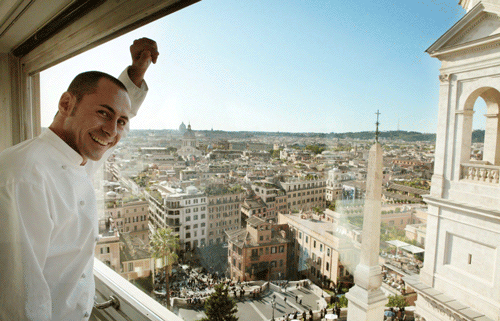
One of the great urban vistas, Imago looks down on the Spanish Steps
Text © 2013
Roberto Wirth, the owner and Director General of Rome’s luxurious Hassler Hotel, is the guiding light of Executive Chef Francesco Apreda’s successful career. At only 19-years old, thanks to Maurizio Morelli, his schoolmate at the hotel school in Formia near Naples in Italy, who already worked at the Hassler, Apreda got a job here too in the kitchen as commis. After a year at The Hassler, Apreda followed Morelli to London, where for five intense years he gained experience at “Le Gavroche” under the strict guidance of its chef/owner Michel Roux; at “Ibla” as Sous Chef; and at “Green Olive” with Morelli, but Wirth never lost track of him. In 2001 he offered Apreda the job of Executive Chef of “Il Cicerone” which he owns; it’s one of the ten restaurants in Tokyo’s splendid Imperial Hotel. Two years later, in 2003, at age 29, Apreda returned to Rome, at Wirth’s request, to become the youngest Executive Chef in The Hassler’s history.
Since 2006 Wirth and Apreda have run “Il Palazzetto,” and since 2007 The Hassler’s rooftop restaurant “Imàgo,” which received its Michelin star a year later. They are also the consultants for two Italian restaurants in India: since 2004 “Il Travertino” in New Delhi and since 2005 “Il Vetro” in Mumbai, both located in Oberoi hotels. The history of The Hassler and the biographies of Wirth (also see “Roberto Wirth, Born a Hotelier,” Epicurean-Traveler.com, February 2007) and of Apreda are chapters in the recently published “Apreda at Imàgo: Haute Cuisine on Rome’s Rooftop,” The Hassler’s and Apreda’s first “cookbook.” Lucy Gordan, our European Bureau Chief, met with Apreda at “Imàgo” the same afternoon that Jorge Bergoglio was elected pope and propitiously chose Apreda’s same name Francesco.
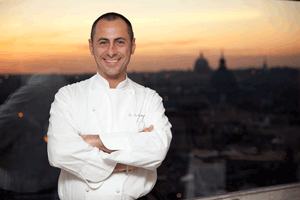
The news hook for this interview is the publication of your first book written together with food critic Antonio Paolini. However, before discussing the book I’d like to know more about your rapport with food and your career as a chef, so let’s begin at the beginning. Our tastes in food are closely connected to our childhood; what are your first memories of food?
FA: Almost everybody’s tastes in food are formed in their family. I was born in Naples, which has a very special culinary tradition. My Apreda grandmother was an excellent cook and my whole family used to get together for lunch at her house every Sunday and on every important holiday. The day before each holiday we gathered in her kitchen to give her a hand. Everyone, including all of us children, had a task. My grandmother gave the orders: “You do this” and “You do that.” These joyous moments, getting together with all my relatives, especially my cousins, huge food-laden tables, eating everything you can think of and still more first stimulated my tastes in food. These memories are fundamental for me. I especially remember the aroma of pasta al forno, of fried dishes especially zeppole fried-to-order and then covered with honey and colored sprinkles. What a joy these moments were for me! These culinary rituals, if you want to call them so, these memories have remained with me always.
How was your love of cooking born?
FA: Both my Apreda grandfather and my father worked in hotels when they were young. That’s because they were from Sorrento and, as you well know, Sorrento is a top tourist destination. My grandfather was a jack-of-all-trades.
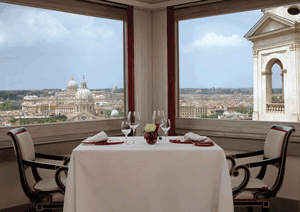
Corner table at Imago
Above all he loved to work in the kitchen doing a bit of everything, the chores that the cooks didn’t do, like peeling potatoes, cleaning the oven, and washing the pots. I remember that he told me over and over again how he dreamed of wearing a chef’s white uniform, even if after The War he got a job in a bank. As for my father, who’d been a doorman at one of Sorrento’s famous hotels, he too got a job in a bank. However, both of them always regretted that they took office jobs with fixed hours instead of sticking to their hotel jobs, in contact with lots of people from all over the world. Nonetheless the white uniform galvanized me. Maybe my grandfather’s repeated stories were the straw that broke the camel’s back and inspired me to become a chef. Who knows, no one else in family has ever been a chef except one of my great-uncles, my Apreda grandmother’s brother, Alberto, who was the chef of the Europa Palace Hotel in Sorrento and quite well-known.
You were 14-years-old when your family moved from Naples to Formia. You changed schools from a CPA diploma to Hotel Management. Why?
FA: It was the decision of a hot-headed adolescent, which I’ve never regretted. In Formia there was and still is a highly respected hotel management school.
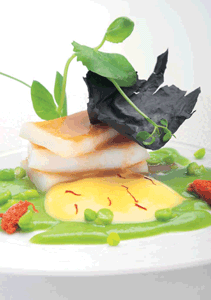
Who were your mentors and what did you learn from each of them?
FA: You could say that Gualtiero Marchesi was “my lighthouse” for my cuisine and Maurizio Morelli my guardian angel more than my mentors. Maurizio and I were schoolmates at the Hotel Management School in Formia. It was he who introduced me to Mr. Wirth. He went to London before me, but, when I got there, he again got me started. We worked together first at “Ibla,” where I was his sous chef, and then at “The Green Olive,” where we were one chef with two heads. He’d already worked at the Halkin Hotel where Gualtiero Marchesi was consultant and Stefano Cavallini was Gualtiero Marchesi’s chef. The restaurant was called “Stefano Cavallini’s Restaurant” and it was one of the first Italian restaurants in London to be awarded a Michelin star. Therefore Marchesi, who is a true professional, very hardworking, with a positive attitude, and inventive, had left his mark on Maurizio. From Maurizio I learned all of Marchesi’s courageous methods and how you can revisit traditional Italian cuisine and change it for the better. Maurizio Morelli has remained in London and owns his own restaurant called “Atium.”
So what else did you learn from Morelli?
FA: I learned how to run a restaurant and how to create my own dishes. When I went to London I was only 24 and Maurizio was 26. In those days in Italy it would have been impossible for him, at the age of 26, to be the Executive Chef of a Michelin-starred restaurant. He and I thought up many original dishes together. My experience up to the time I worked with him in London had been learning the basics.
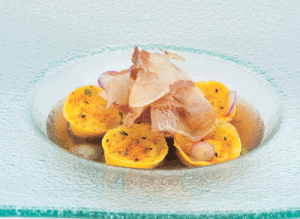
Parmesan Cappellotti in broth
You worked at the temple of gastronomy “Le Gavroche” for years considered the best restaurant in London, right?
FA: Yes, it was my ambition to work in one of London’s top restaurants. I had an interview with a headhunter and told him that I wanted to work in a restaurant with 3 Michelin stars. He tried to talk me out of it, but with no success so he arranged an interview for me with another headhunter. This second one asked me lots of tricky questions like: If the Executive Chef should lose his temper and throw at pan at you, how would you react? Or what would you do if you were given no break or food all day long? He made me a bit uneasy, but to his first question I answered: “Ì’d move out of the way and continue working.” I must have answered all his other questions to his satisfaction because I got a job at “Le Gavroche.”
What did you learn from Michel Roux?
FA: “Le Gavroche” was and still is an institution with a capital I. Everything that happened there was for certain perfect. Working there gave me self-discipline and such a high standard that anything I learned there and put into practice afterwards is always perfect. The way things were done at “Le Gavroche” was the way they should be done. No question about it! I worked there for a year, but it was like an intense 4-year course in one.
Other chefs you admire?
FA: I admire all the chefs who worked under Marchesi’s guidance. They had an experience that I can never have so I’m a bit envious of them. They’ve all been successful in their own right afterwards: Cracco, Oldani, Crippa, Molteni, Leemann…
What has Roberto Wirth taught you?
FA: Mr. Wirth is very demanding, meticulous when it comes to food. He’s a true gourmet. I’m really happy when he comes to eat at “Imàgo.” He gives me advice not only about my dishes, but also about the service, the place settings, and the silverware. The hotel is his life. He adores my scallops, but he often eats venison and lamb. At lunch he usually eats fish and at supper pasta and meat.
What are the essential qualities of a top chef?
FA: Stubbornness and creativity, and many others…
What do you like best about your work?
FA: The creativity, but I am a very precise person so I also enjoy the managerial side. Yes, I’m the Executive Chef of “Imàgo,” but also of the entire Hassler Hotel and “Il Palazzetto.” Ì also do consultancies and organize events so I feel like a manager. Certainly the creative aspect gives the most satisfaction and vitality.
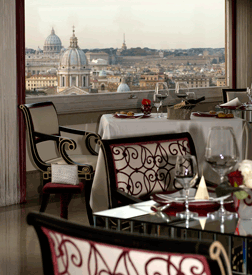
The least?
FA: The lack of time with my family, but I knew that would be the case and that being a chef was hard work.
What’s your culinary philosophy?
FA: I tend to create the most traditionally Italian dishes possible, but of course they have a foreign twist because of all the years I lived abroad. Precisely because of all the years I lived abroad — 12 to be exact — I realized how important Italian cuisine is. However, it’s inevitable that after 12 years abroad, a few foreign influences have slipped into my style. You could say that my dishes reflect my life. They are mine. These are the dishes we serve at “Imàgo.” People like my cuisine. I’m a typical tenacious Capricorn and go my own way. I travel more and more. India is evermore present. I love to travel.
In a nutshell, how would you define your cuisine?
FA: Contemporary, Italian, but influenced by my experiences in Japan and India. Each dish has all its essential ingredients. After seven years at “Imàgo” all the dishes that have given me the greatest satisfaction, both because of their flavor and their presentation, were born with a story to tell. For example, the reason and the process of its creation accompany each dish in my book. Because of this the dish is mine. It’s mine because I tell its story. Behind every one of my dishes there’s a story.
You talk about the foreign influences on your cuisine, but what’s Neapolitan about it?
FA: Being Neapolitan is part of my internal make-up, in my DNA. Most Neapolitans, who like me left Naples because of lack of opportunity and later achieve success elsewhere, are always frustrated and angry because they know that they would never have achieved the same success in Naples. We wistfully think: “If only I could have made a name for myself in Naples!” On the bright side we Neapolitans have a strong sense of adaptability. As far as I’m concerned, wherever I go, I’m always ready to learn and absorb the local culture, not just on the professional level, but also on the personal one because every culture has its positive aspects.
What are your signature dishes and other specialties?
FA: Breaded scallops stuffed with buffalo mozzarella, celery leaves, and black truffles; Parmesan cappellotti in a cold tuna, double malt, and 7 spices broth; angel-hair pasta with oil, garlic, chili peppers, smoked eel, and bitter cocoa; cod carbonara glazed in sake, Indian curried baby squid in a purple field. It’s difficult for me to say which dish I’m proudest of and like to prepare the most. At the moment I’m into risotto.
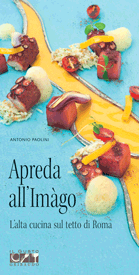
Cover of Apreda’s cookbook
As I’ve said, the news-hook for this interview is the publication last December withjournalist and food-critic Antonio Paolini of your book Apreda at Imàgo: Haute Cuisine on Rome’s Rooftop; why now?
FA: To celebrate the 10th anniversary of my appointment as The Hassler’s Executive Chef. My loyal guests kept on encouraging me and insisting that it was time to take this plunge. I’ve always loved to leaf through, read, and buy cookbooks, often with the excuse that someday I too would write one. I think of this experience as “rounding the buoy.” Apreda at Imàgo is The Hassler’s first “cookbook.” I say cookbook in quotes because beside my recipes, it includes a history of the hotel, Wirth’s biography and mine. The recipes are divided by season like Gordon Ramsey’s book, which I used to consult often, not to copy its recipes, but to know the ingredients of each season.
Why did you write it with Antonio Paolini and not by yourself?
FA: Antonio Paolini is a very experienced journalist and food critic who has won numerous prizes for his work. He’s on the Board of Directors of the Espresso Guide and a territorial coordinator of “Vini Buoni d’Italia” (Italian Touring Club). Ever since I came back to Rome, he’s been one of my followers. He can be very technical and wants to taste my dishes flavor by flavor. We’ve always exchanged opinions. A feeling of respect and friendship developed between us. The publisher Gribaudo and I agreed on Antonio and he was happy too because he and I were already friends.
Up to now you’ve told me about Francesco Apreda the chef; I’d like to know more about Francesco Apreda himself. For example, what are your favorite foods?
FA: Risotto and pasta, especially my wife’s lasagna and her eggplant Parmesan.
You’re Neapolitan; what’s your favorite Neapolitan dish?
FA: My mother’s spaghetti alla puttanesca.
You were born a pastry chef. In Formia you and a friend started to cater parties for your friends, families, and neighbors; what’s your favorite dessert?
FA: The Neapolitan pastiera, which is an Easter sweet.
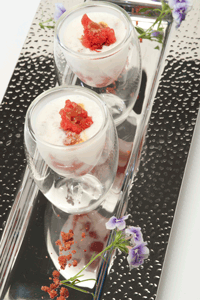
Granita-ai-frutti-di-bosco-e-balsamico,-fluida-di-yogurt-e-cioccolato-bianco
Mr. Wirth sent you to Japan for two years and you loved it there. What do you miss about Japan?
FA: I miss the food. In Japan the food is much more than sushi; there are many different local culinary traditions like here in Italy. I miss the Tsukiji, the wholesale fish market in Tokyo. At least once or twice a week I’d go there at 4 or 5 in the morning to eat sushi.
Now you go to India frequently because Wirth has two restaurants there. What do you especially like about India?
FA: I love the huge variety of spices, Indian hospitality, the way Indians smile, and their adaptability. I love their culinary traditions too. The first times I went there, I always felt as if my mouth was on fire. I thought their food was much too spicy, even if I love pepperoncino. But then my palate got accustomed and now, whenever I go to India, I comb the markets for unusual spices. Now I know how and when to use them in the dishes I create for “Imàgo.”
In your book you talk about your new-found love for spices thanks to India, which ones?
FA: Yes, I love fresh basil, which is really an aroma more than a spice. Thanks to India I discovered the betel nut. I love the colorful open-air markets in India. Each time I go there I come home with suitcases full of spices.
A dish you dislike?
FA: Gnocchi. I don’t like their consistency. They’re gummy and stick to your teeth.
Your favorite wines?
FA: Italian sparkling wines, but obviously I appreciate French champagne.
If they hadn’t become chefs, Heinz Beck told me he had wanted to be a painter, Marchesi a pianist; Thomas Keller the shortstop for the New York Yankees. What about you?
FA: I love fashion and I love being a manager so let’s say I would have liked to be the marketing director for an important fashion house.
You say in Apreda at Imàgo that for now your professional ambition is the “Imàgo Project,” to spread the excellence of the Hassler’s Italian cuisine worldwide, in short to expand your consultancies in the future restaurants Mr. Wirth is planning to open in the world’s great capitals. But do you have a pipe dream?
FA: For now my job is here at “Imàgo.” The opportunities Mr. Wirth has given me to travel the world have given me enormous satisfaction. I’ve always known how to transmit my love of Italian cuisine, our authentic products, and our culture, to foreigners. Maybe in the not too far-off future, Mr. Wirth and I will begin a consultancy in Buenos Aires. I’m a fanatic fan of the Naples soccer team and of its star, my childhood hero, Diego Maradona, who’s from Argentina. I have Argentina in my blood. Maybe many years down the line, maybe when my children are grown and if they want to follow in my footsteps, I might open a small cozy family-run restaurant by the sea in Formia.
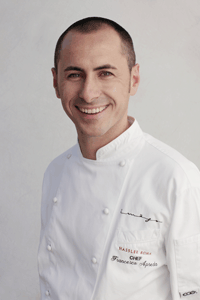
& & &
